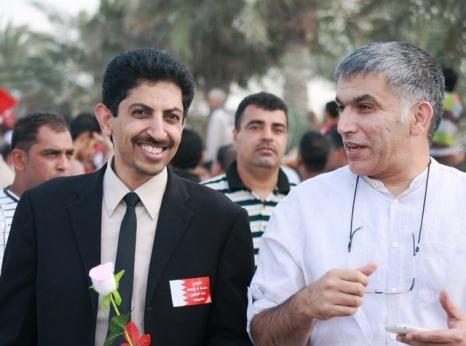Bahrain: Prisoner Of Conscience Convicted And Fined

Prominent human rights defender Abdulhadi Al-Khawaja, aged 61, is married and has four daughters and four grandchildren. He co-founded both the Gulf Centre for Human Rights (GCHR) and the Bahrain Center for Human Rights (BCHR). Until early 2011, al-Khawaja worked as MENA Protection Coordinator for the human rights group Frontline Defenders. He also previously took part in an Amnesty International fact-finding visit to Iraq in 2003 and is a member of the International Advisory Network of the Business and Human Rights Resource Centre. He is a peaceful advocate of human rights and the recipient of several human rights awards, including the Dignity - World without Torture Award which he received in October 2013. Most recently, in 2022, he obtained the prestigious Martin Ennals Award for Human Rights Defenders.
Citing the Covid-19 pandemic, Jaw prison authorities restricted and cancelled family visits for all prisoners from January 2020 to February 2022 and visits remain more exceptional than regular. Al-Khawaja’s family visits resumed in May 2022. Phone calls are allowed once a week, but these are restricted to the same five people. Previously, he was allowed to speak to his family between 20-25 minutes each Sunday, but over the past year those calls are often reduced as a way of punishing him for his activism inside prison. On 16 November 2021, Al-Khawaja began a hunger strike in protest at being denied phone calls to his daughters who live abroad. He ended it three days later when the authorities reinstated these calls.
On 6 November 2022, during a call to his daughters, Al-Khawaja said that he was facing a number of separate new trials. On 3 November 2022, his trial began in his absence before the Second Lower Criminal Court for allegedly breaking a plastic chair in November 2021 and insulting a police officer in Jaw prison after being denied phone calls to his daughters who live abroad. A second hearing on 16 November was rescheduled for 28 November because Al-Khawaja, who wanted to attend it, had to first sign a power of attorney document for his lawyer to represent him in court. However, while waiting to do so in prison, an officer in charge attempted to pressure and threaten him into recording a video stating that he was refusing to attend the hearing. Al-Khawaja refused and repeatedly stated on camera that he wanted to attend the hearing. He was then transferred back to his cell without being allowed to sign the power of attorney.
On 21 November, his second trial began on charges of insulting a public servant. The case relates to an incident on 30 March 2022, when Al-Khawaja protested against the normalization deal with Israel (Abraham Accords) and told a prison officer “You are a dirty and unclean person. You have a way of treating people like animals”. The hearing was also postponed to 28 November.
Abdulhadi Al-Khawaja is serving a life sentence in Jaw prison. He is among 14 opposition activists who were arrested between 17 March and 9 April 2011 during the Bahrain uprising. On 28 September 2011, in a session that lasted only a few minutes, the National Safety Court of Appeal, a military appeal court, upheld all the convictions and sentences imposed on the 14 opposition activists. These ranged between two years and life in prison on charges including “setting up terror groups to topple the royal regime and change the constitution”. On 30 April 2012, the Court of Cassation in Manama ordered them to appear before a civilian court for an appeal trial. The High Criminal Court of Appeal upheld their convictions and sentences on 4 September 2012, and on 6 January 2013, the Cassation Court confirmed the verdict. Four of the 14 men have so far been released, three of them having served their sentences. The fourth one, Mohammed Hassan Jawad, was released on probation from Jaw prison, just over 10 years into serving his 15 years' prison sentence, under a new law, Decree of Act No. 24 of 2021, which expanded alternative sentencing.
In May 2012, the UN Working Group on Arbitrary Detention considered that Al-Khawaja’s detention was arbitrary as it resulted from his exercise of the rights to freedom of expression, association and peaceful assembly; and called for his immediate release and an enforceable right to compensation.